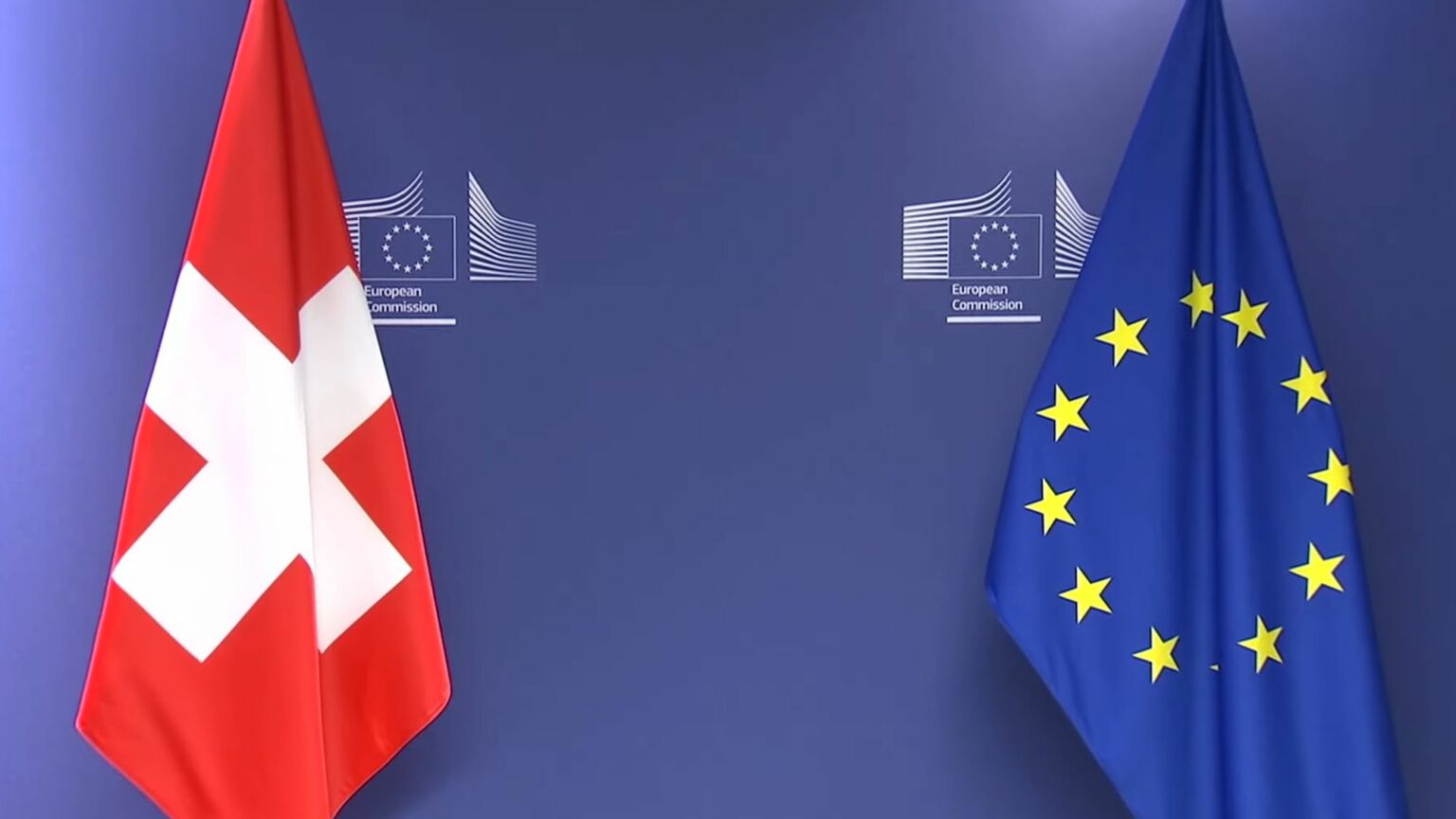The EU plot to ensnare Switzerland
A new ‘cooperation agreement’ with Brussels looks certain to undermine Swiss democracy.

Want to read spiked ad-free? Become a spiked supporter.
Switzerland and the European Union have restarted negotiations on a cooperation agreement that would deepen their institutional and trading ties. It would also do great damage to Swiss democracy and sovereignty.
Earlier this month, Viola Amherd, Switzerland’s federal president, met with Ursula von der Leyen, the president of the European Commission, to start the discussions. According to the EU mandate for the talks, the aim is to complete negotiations by the end of this year, before Switzerland’s federal council eventually puts the deal to the public in a referendum. This could happen anytime between 2026 and 2029.
It should be said that all this is far from a fait accompli. Swiss politicians have already tried and failed to deepen institutional ties with the EU before. Following negotiations lasting seven years, the federal council was forced to pull out in 2021 after a proposed agreement received a resounding thumbs down from Swiss politicians and the broader public. Left-wingers complained that the agreement would undermine wage protections for Swiss workers, while right-wingers did not want to give the Court of Justice of the European Union (CJEU) sovereignty over Switzerland’s laws. An incensed EU responded punitively, denying the Swiss stock exchange access to European financial markets, slapping expensive regulations on Switzerland’s medical technology industry and restricting cooperation in the electricity market.
Now, however, pressure from Switzerland’s political and economic elites seems to have pushed the federal council back to the negotiating table. Worryingly, the EU mandate suggests that any agreement between the two sides will be little different to that which was proposed in 2021.
Brussels and the federal council are seeking to update five existing bilateral agreements on freedom of movement, trade, agriculture, air travel and land transport. They also aim to hammer out new cooperation agreements on electricity, food security, healthcare, research programmes and education.
All of this may sound benign, but the devil is in the detail. First published in December 2023, the EU’s mandate states that under any agreement, Switzerland should automatically adopt EU laws relating to areas of bilateral cooperation. Should Switzerland decline to do so, the Commission calls for the establishment of a joint court of arbitration. Any arguments over the interpretation or application of EU law would then be subject to the supreme authority of the CJEU. In other words, the EU will ultimately render Switzerland powerless in any dispute.
Furthermore, if Switzerland defies the CJEU, the Commission recommends imposing ‘compensatory measures’ – in other words, punishments – via a joint arbitration court. For example, if Switzerland refuses to adopt any given EU law, Brussels could ‘compensate’ by slapping tariffs on Swiss agricultural produce, or excluding Switzerland from research programmes like Horizon.
Make no mistake, these negotiations are once again preparing the way for the subjugation of Switzerland to foreign laws and courts. As a cherry on top of this miserable cake, Switzerland is being asked to make a ‘permanent financial contribution to social and economic cohesion in the EU’. The amount is unspecified, but it is likely to be significant.
The most contentious of all the laws the EU wants to foist upon Switzerland is the Citizens’ Rights Directive (CRD). Under the CRD, EU nationals would be entitled to reside in Switzerland and obtain social-security benefits permanently, after just one year of working there. Many in Switzerland object to the directive, fearing that it could attract welfare-seekers from poorer EU countries.
Indeed, such is the domestic unpopularity of any prospective agreement with the EU that the Swiss pro-EU lobby is already trying to lower the bar for passing the agreement in a referendum.
Usually, decisions of great constitutional importance in Switzerland require what’s called a ‘mandatory referendum’. To pass, mandatory-referendum motions have to win the support of a majority of both the people as a whole, and a majority of the 26 cantons. But those pushing for a new EU-Switzerland agreement are advocating a different sort of referendum on any deal, called a ‘facultative referendum’. This type of referendum only requires a majority among the popular vote, not the cantons. This has caused outrage among many legal and constitutional experts. To subject a deal this wide-ranging to only a popular vote would be unprecedented in Switzerland.
There is already plenty of opposition to the deal that is taking shape. The right-wing populist Swiss People’s Party (SVP) – the largest political party in Switzerland – argues that the EU is seeking to rob Swiss citizens of their basic constitutional rights. And the SVP is far from alone in thinking this. Ronnie Grob, the editor-in-chief of liberal magazine Schweizer Monat, claims that far from being a bilateral deal between equal partners, any contract is likely to establish the EU’s power over Switzerland.
The left is split on closer links with the EU. Left-wing politicians tend to support closer integration with Brussels, while trade unions are resistant. They are concerned that any agreement will lower wages and threaten workers’ rights. However, the unions’ stance does suggest that if Brussels made certain guarantees over workers’ rights, they could well cave in and support the new agreement. This would be a huge betrayal.
The stakes could hardly be higher. Should Brussels get its way, then the once fiercely independent Switzerland is at real risk of becoming a vassal state of the EU. This agreement must be resisted.
Andrea Seaman is a writer based in Switzerland.
Picture by: YouTube.
To enquire about republishing spiked’s content, a right to reply or to request a correction, please contact the managing editor, Viv Regan.









Comments
Want to join the conversation?
Only spiked supporters and patrons, who donate regularly to us, can comment on our articles.